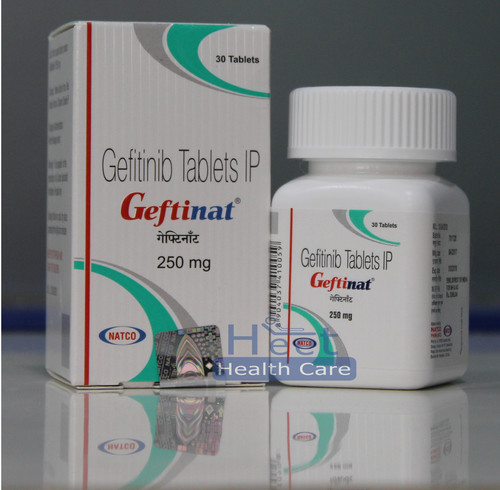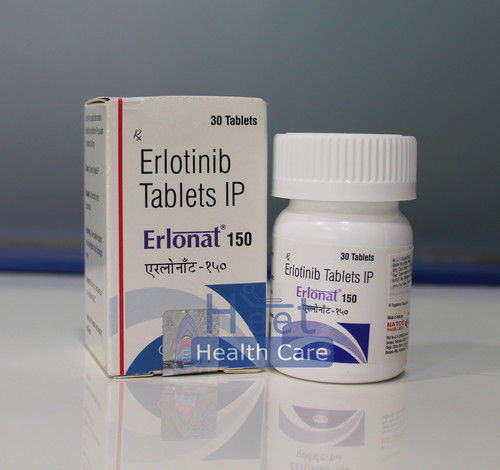Geftinat Gefitinib Tablets
Product Details:
Geftinat Gefitinib Tablets Price And Quantity
- INR
Geftinat Gefitinib Tablets Trade Information
- Delhi, Mumbai
- Cash Advance (CA) Letter of Credit (L/C) Letter of Credit at Sight (Sight L/C) Western Union Paypal Telegraphic Transfer (T/T) Cash in Advance (CID) Cheque
- 10000 Per Month
- 7 Days
- 30 Tablets per bottle
- Australia Central America North America South America Eastern Europe Western Europe Middle East Africa Asia
- All India
Product Description
Gefitinib, a tyrosine kinase inhibitor used to treat some cancers, especially non-small cell lung cancer (NSCLC) with certain mutations, is the active component of Geftinat tablets. Gefitinib functions by inhibiting specific proteins that encourage the growth and division of cancer cells. Patients with NSCLC who have an epidermal growth factor receptor (EGFR) mutation are prescribed it. Geftinat helps eligible patients manage their cancer's growth, alleviate their symptoms, and maybe extend their survival time. Based on the characteristics of each patient and the type of cancer, the healthcare provider decides on the dosage and length of treatment. To manage any adverse effects and guarantee the best possible treatment results, regular medical monitoring is required.
Geftinat Gefitinib Tablets' features and advantages include:
Features:
1. Gefitinib, a tyrosine kinase inhibitor, is the active substance found in Geftinat Gefitinib Tablets.
2. Gefitinib, which specifically targets cancer cells with EGFR mutations while sparing healthy cells, is a form of targeted therapy.
3. Treatment for Non-Small Cell Lung Cancer (NSCLC): Geftinat is primarily used to treat NSCLC that carries a certain EGFR mutation.
4. Geftinat is administered orally and is easy for patients to administer at home because it comes in tablet form.
Benefits:
1. Geftinat is advantageous for individuals with NSCLC who have EGFR mutations, resulting in more successful treatment outcomes.
2. Gefitinib disrupts particular proteins, which prevents the growth and division of cancer cells and slows the spread of the disease.
3. Geftinat may lessen the chest discomfort, cough, and shortness of breath that are NSCLC-related symptoms.
4. Extended Survival: Geftinat therapy has demonstrated to potentially increase survival rates in patients with NSCLC who test positive for the EGFR mutation.
5. Geftinat helps eligible patients delay the advancement of NSCLC, slowing the course of the disease.
6. Improved Quality of Life: Geftinat may improve the quality of life for NSCLC patients by successfully treating the disease.
7. Combination Therapy: Geftinat can be used in conjunction with other drugs to treat cancer in a complete manner.
It is crucial to remember that Geftinat Gefitinib Tablets should only be used when directed to do so by a licenced healthcare provider. Before beginning treatment, patients should talk with their healthcare provider about possible side effects and advantages. To manage potential side effects and achieve the greatest results, regular medical monitoring is essential. To manage side effects and maximise therapy efficacy, patients should be regularly watched and given supportive care.
Geftinat Gefitinib Tablets are used for:
The primary indication for the usage of Geftinat Gefitinib Tablets is the management of patients with non-small cell lung cancer (NSCLC) who have particular epidermal growth factor receptor (EGFR) mutations. For the following conditions, it is prescribed:
1. For the treatment of advanced or metastatic NSCLC with EGFR exon 19 deletions or exon 21 (L858R) replacement mutations, geftinat is recommended.
Geftinat Gefitinib Tablet Side Effects:
Geftinat Gefitinib Tablets might have negative effects, just like any other medication. Typical negative consequences could be:
- Skin Rash or Acne-like Rash
- Diarrhea
- Nausea and Vomiting
- Fatigue or Weakness
- Loss of Appetite
- Dry Skin or Itching
- Nail Changes
- Mouth Sores
- Conjunctivitis (Pink Eye)
- Elevated Liver Enzymes
- Interstitial Lung Disease (rare but serious side effect)

Price:
- 50
- 100
- 200
- 250
- 500
- 1000+
Other Products in 'Anti Cancer Medicine' category
 |
HEET HEALTHCARE PVT. LTD.
All Rights Reserved.(Terms of Use) Developed and Managed by Infocom Network Private Limited. |

 Send Inquiry
Send Inquiry English
English Spanish
Spanish French
French German
German Italian
Italian Chinese (Simplified)
Chinese (Simplified) Japanese
Japanese Korean
Korean Arabic
Arabic Portuguese
Portuguese








